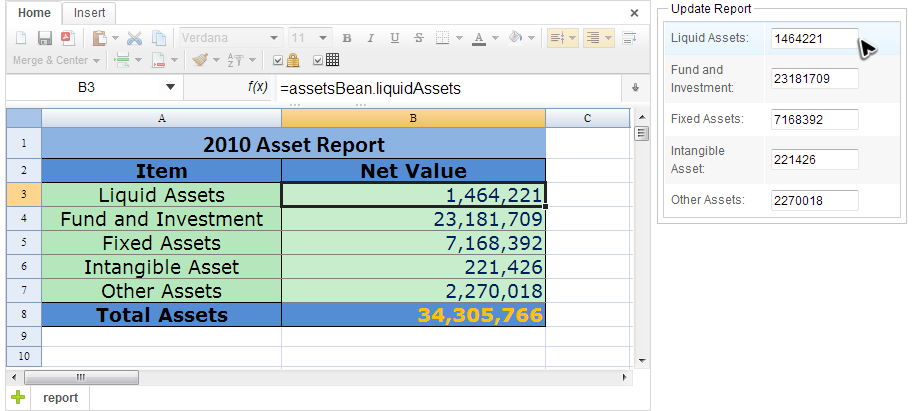Reference to Spring Beans
Overview
Similar to reference to Java Bean, Spreadsheet also allows you to use EL (Expression Language) in cells and it resolves the name expressions to Spring beans.
The process of resolving a variable to a Spring bean is the same the one
of resolving to a Java Bean. The difference is when Spreadsheet asks a
variable resolver defined in the zul page to retrieve the bean, we give
it a Spring bean resolver that resolves variables as Spring beans.
Hence, to use the feature is quite simple, just declare a Spring bean
resolver in a ZUL page and use same EL expression as we use in Java
Bean, e.g. enter =myBean.myProperty.
Example
We continue to use the same example in Reference to Java Beans. Assume the application below has a sheet in protection, a user cannot modify any cells directly in the sheet. They can only update value via panel on the right side.

You can see from the formula bar, the content of B3 is an EL expression,
=assetsBean.liquidAssets.
To use Spring bean resolver, there must be some Spring bean defined in
your application. In our example, it’s AssetsBean:
1
2
3
4
5
6
7
8
9
10
@Component
@Scope(value="session", proxyMode=ScopedProxyMode.TARGET_CLASS)
public class AssetsBean {
private double liquidAssets;
private double fundInvestment;
private double fixedAssets;
private double intangibleAsset;
private double otherAssets;
...
}
Declare ZK’s org.zkoss.zkplus.spring.DelegatingVariableResolver in a
ZUL page. (You can refer to ZK Developer Reference
1
2
3
4
5
6
7
8
9
10
11
12
13
14
15
<?variable-resolver class="org.zkoss.zkplus.spring.DelegatingVariableResolver"?>
<zk>
<window hflex="1" vflex="1"
apply="io.keikai.essential.advanced.RefSpringBeanComposer">
<hlayout hflex="1" vflex="1">
<spreadsheet id="ss" src="/WEB-INF/books/bean.xlsx"
maxrows="200" maxcolumns="40"
showFormulabar="true" showContextMenu="true"
showToolbar="true" showSheetbar="true"
hflex="1" vflex="1" width="100%" >
</spreadsheet>
...
</hlayout>
</window>
</zk>
Example
We continue to use the same example in Reference to Java Beans. Assume the application below has a sheet in protection, a user cannot modify any cells directly in the sheet. They can only update value via panel on the right side.

You can see from the formula bar, the content of B3 is an EL expression,
=assetsBean.liquidAssets.
To use Spring bean resolver, there must be some Spring bean defined in
your application. In our example, it’s AssetsBean:
1
2
3
4
5
6
7
8
9
10
@Component
@Scope(value="session", proxyMode=ScopedProxyMode.TARGET_CLASS)
public class AssetsBean {
private double liquidAssets;
private double fundInvestment;
private double fixedAssets;
private double intangibleAsset;
private double otherAssets;
...
}
Declare ZK’s org.zkoss.zkplus.spring.DelegatingVariableResolver in a
ZUL page. (You can refer to ZK Developer Reference
for detail.)
1
2
3
4
5
6
7
8
9
10
11
12
13
14
15
<?variable-resolver class="org.zkoss.zkplus.spring.DelegatingVariableResolver"?>
<zk>
<window hflex="1" vflex="1"
apply="io.keikai.essential.advanced.RefSpringBeanComposer">
<hlayout hflex="1" vflex="1">
<spreadsheet id="ss" src="/WEB-INF/books/bean.xlsx"
maxrows="200" maxcolumns="40"
showFormulabar="true" showContextMenu="true"
showToolbar="true" showSheetbar="true"
hflex="1" vflex="1" width="100%" >
</spreadsheet>
...
</hlayout>
</window>
</zk>
When Spring Bean Changes
In our example, the sheet is protected. Users can only change value from the panel on the right hand side. But Spreadsheet won’t know the change of a bean unless you notify it. When you notify the Spreadsheet of changed beans, it will collect which cells are affected (i.e. those dependent cells with the specified bean names), and update them accordingly.
1
2
3
4
5
6
7
8
9
10
11
12
13
14
15
16
17
18
19
20
21
22
23
24
25
26
27
28
29
30
31
32
33
34
35
36
37
38
39
40
41
42
43
44
@VariableResolver(org.zkoss.zkplus.spring.DelegatingVariableResolver.class)
public class RefSpringBeanComposer extends SelectorComposer<Component> {
@Wire
private Spreadsheet ss;
@Wire
private Doublebox liquidBox;
@Wire
private Doublebox fundBox;
@Wire
private Doublebox fixedBox;
@Wire
private Doublebox intangibleBox;
@Wire
private Doublebox otherBox;
@WireVariable
private AssetsBean assetsBean;
@Override
public void doAfterCompose(Component comp) throws Exception {
super.doAfterCompose(comp);
Ranges.range(ss.getBook().getSheetAt(0)).protectSheet("");
}
@Listen("onChange = doublebox")
public void update() {
updateAssetsBean();
//notify spreadsheet about the bean's change
Ranges.range(ss.getSelectedSheet()).notifyChange(new String[] {"assetsBean"} );
}
/**
* load user input to the bean.
*/
private void updateAssetsBean() {
assetsBean.setLiquidAssets(liquidBox.getValue());
assetsBean.setFundInvestment(fundBox.getValue());
assetsBean.setFixedAssets(fixedBox.getValue());
assetsBean.setIntangibleAsset(intangibleBox.getValue());
assetsBean.setOtherAssets(otherBox.getValue());
}
}
- Line 1: Add a variable resolver
let us get Spring beans with
@WireVariable. - LIne 17: We can easily get a reference to a Spring with
@WireVariable. Please refer to ZK Developer Reference for detail. - Line 30: Notify whole book of one or more beans’ change, all cells of whole book associated with changed bean will be updated.